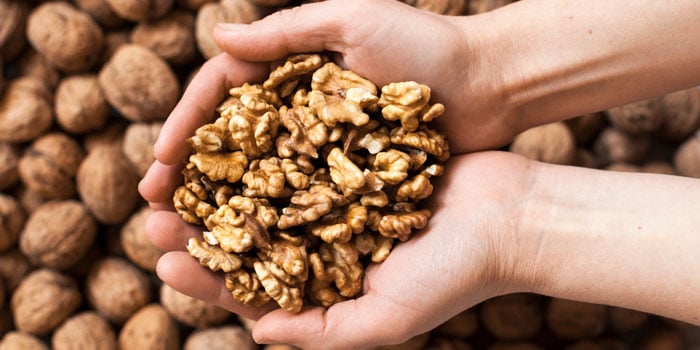LAHORE – Walnuts are a wrinkly, globe-like nut that is the fruit of the walnut tree. They grow in a hard shell, which when opened reveals the walnut. This is then split in two and hence you get the more familiar flat segments. Walnuts are usually eaten raw or roasted.
Below are 7 proven health benefits of adding walnuts to your daily diet:
Promotes a healthy gut: Studies suggest that if your gut is rich in health-promoting bacteria and other microbes, you’re more likely to have a healthy gut and good overall health.
An unhealthy composition of your microbiota can contribute to inflammation and disease in your gut and elsewhere in your body, increasing your risk of obesity, heart disease, and cancer.
Eating walnuts may be one way to support the health of your microbiota and your gut.
Anti-cancer benefits: Observational studies suggest that eating walnuts may reduce your risk of certain cancers, including breast, prostate and colorectal cancers.
Urolithins can have anti-inflammatory properties in your gut, which may be one way that eating walnuts help protect against colorectal cancer.
Supports healthy aging: As you age, good physical functioning is essential for maintaining your mobility and independence. One thing that may help maintain your physical abilities is healthy eating habits.
Supports good brain functioning: It may be just a coincidence that the shell of a walnut looks like a tiny brain, but research suggests that this nut may indeed be good for your mind.
Animal and test-tube studies found that the nutrients in walnuts, including polyunsaturated fat, polyphenols, and vitamin E, may help reduce oxidative damage and inflammation in your brain.
Improves blood fats: Elevated levels of “bad” LDL cholesterol and triglycerides have long been linked to an increased heart disease risk. Walnuts have also helped in decreasing the cholesterol level.
For example, in a recent study in 194 healthy adults, eating 1.5 ounces (43 grams) of walnuts daily for eight weeks produced a 5% decrease in total cholesterol, 5% decrease in LDL cholesterol and 5% decrease in triglycerides.
Supports weight control: Walnuts are calorie dense, but studies suggest that the energy absorbed from them is 21% lower than would be expected based on their nutrients.
In a well-controlled study in 10 obese people, drinking a smoothie made with about 1.75 ounces (48 grams) of walnuts once a day for five days decreased appetite and hunger, compared to a placebo drink equal in calories and nutrients.
Good source of Vitamin E: portion. The form of vitamin E found in walnuts is somewhat unusual, and particularly beneficial. Instead of having most of its vitamin E present in the alpha-tocopherol form, walnuts provide an unusually high level of vitamin E in the form of gamma-tocopherol.















